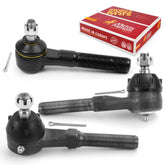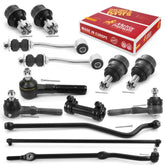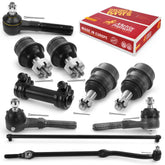Comparing Aluminum and Steel Control Arms for Your Vehicle's Suspension
In the fast-paced realm of car upgrades, deciding between steel and aluminum control arms is a hot topic for car lovers and experts. These parts greatly affect how your vehicle's suspension and overall performance work. This blog closely examines steel and aluminum control arms, weighing their pros and cons. By helping you understand this key choice, we want to guide you in making a smart decision to boost your vehicle's performance.
Steel control arms are commonly used components in vehicle suspension systems, offering their own set of advantages and characteristics. On the other hand, aluminum control arms are a popular choice for vehicle suspension systems due to their lightweight and performance-enhancing properties. They offer several advantages when compared to traditional steel control arms, but it's important to note that aluminum control arms may have some limitations and considerations. Here is the comparison of aluminum and steel control arms for your vehicle's suspension:
- Weight: Aluminum is significantly lighter than steel. This reduced weight can have several benefits, including improved fuel efficiency, better handling, and reduced unsprung weight, which can contribute to better ride quality and traction.
- Performance: Aluminum control arms can offer better performance due to their lower weight. Lighter control arms can enhance the suspension's responsiveness and reduce body roll, contributing to improved handling and cornering capabilities.
- Durability and Strength: Steel is generally stronger and more durable than aluminum. Steel control arms are better able to withstand heavy loads, impacts, and harsh conditions, making them more suitable for off-road or heavy-duty applications. Aluminum control arms may be more prone to bending or breaking under extreme stress.
- Corrosion Resistance: Aluminum has a natural resistance to corrosion due to its ability to form a protective oxide layer. However, steel control arms are often treated with coatings or materials like galvanization to prevent rust and corrosion. Proper coating and maintenance can ensure the longevity of both aluminum and steel control arms.
- Cost: Steel is generally less expensive than aluminum, both in terms of material costs and manufacturing processes. If cost is a significant factor, steel control arms may be a more economical choice.
- Customization and Tuning: Aluminum is more malleable than steel, which can make it easier to shape and customize for specific performance requirements. This can be advantageous if you're looking to fine-tune your suspension for specific driving conditions.
- OEM vs. Aftermarket: Original equipment manufacturer (OEM) control arms are often made of steel due to their durability and cost-effectiveness. Aftermarket control arms, on the other hand, may offer both steel and aluminum options, catering to different preferences and performance needs.
The choice between aluminum and steel control arms for your vehicle's suspension depends on your priorities and how you intend to use your vehicle. If you're aiming for improved performance, better handling, and reduced weight, aluminum control arms could be a good choice. On the other hand, if durability, strength, and cost are higher priorities, steel control arms might be more suitable. When making this decision, consider factors such as the vehicle's intended use, driving conditions, budget, and personal preferences. Metrix Premium Chassis Parts offers both types of control arms at https://metrixpremiumparts.com. Visit our website to find the best part for your own vehicle.









